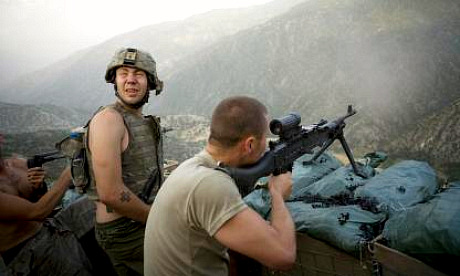Two nights ago at Houston’s Angelika Film Center, one of the stars of Restrepo — Sgt. Misha Pemble-Belkin — dropped by for a q & a. The following day Culturemap‘s Joe Leydon (who may or may not have conducted the interview with Pemble-Belkin) posted an admiring account of his visit.

Restrepo is a narrowly focused, bravely captured documentary about U.S. troops fighting in Afghanistan’s Korangal Valley from ’07 to ’08. Pemble-Belkin, now stationed at Louisiana’s Fort Polk, was one of those interviewed and befriended by co-directors Sebastian Junger and Tim Hetherington during their year-long stay.
For my money Leydon’s article seems a little too obliging, primarily because it mentions but doesn’t begin to explore an idea that’s been seeping through here and there, which is that Restrepo is a pro-war, support-the-troops, emotional-propaganda piece wrapped in allegedly neutralist observational verite clothing.
The apparent bottom line is that Junger and Hetherington, like many embedded war journalists before them, “fell in love” with their subjects, and in so doing evolved into supporters of the U.S. Afghanistan campaign. It seems as if they were unable to separate their feelings for the troops and the war that has taken the lives of over 1000 Americans. It’s been reported that Junger has recently been pushing a stay-the-course policy on news talk shows.
Pemble-Belkin obviously knows whereof he speaks and has an absolute right to say what he’s learned and believes about the war in Afghanistan. But reading that he wants to stay in the Army “until we win the war…I don’t want it to go on until my children are old enough to have to go over there” made me furious.
“Win” in Afghanistan? We’re not even stalemating over there. The effort is doomed and we’re on a timetable to evacuate. On top of which the movie doesn’t even explain that U.S. military command pulled out of the Korangal Valley last fall because they could see it was a losing effort.

It is bothersome that Leydon, the good host and gentle inquisitor, doesn’t even tip-toe into this, much less address Pemble-Belkin’s delusion that we might “win” over there. And yet he lets him get away with “politely but firmly” declining to answer “what he calls ‘political questions.'”
Let me explain something. Everything involved in the fighting of a war is political, and all questions about any aspect of that war, including a friendly documentary that presents a highly selective, grunt’s-eye view, are political. And anyone who stands up for the honest but restricted reporting in Restrepo is standing up for its roundabout pro-war stance. So Pemble-Belkin driving from Ft. Polk to Houston on a motorcycle to take part in the Angelika interview, was, in every sense of the term, a political act. Because in so doing he’s taking part in the Restrepo smokescreen, which is the filmmakers trying to pretend that it’s not political by focusing solely on the day-to-day lives of soldiers and saying, “Isn’t it fascinating and touching the way these guys just hang in there and do their job and survive and shit?”
Never trust anyone who says he’d rather not get into political questions. That’s a total chickenshit dodge.
Here’s how I put it in an HE piece called “Afghanistan Bananistan“:
“The kind of frankness that Restrepo is offering is, to put it mildly, selective. For realism’s sake Restrepo chooses to isolate its audience inside the insular operational mentality of the grunts — ‘get it done,’ ‘fill up more sandbags,’ ‘ours not to reason why’ and so on. In so doing it misleads and distorts in a way that any fair-minded person would and should find infuriating. Is there any other way to describe a decision to keep viewers ignorant about any broader considerations — anything factual or looming in a political/tactical/situational sense — that might impact the fate of the subjects, or their mission?
“Imagine a documentary about the day-to-day life of Steve Schmidt, John McCain‘s ’08 presidential campaign manager, that ignores how the campaign is going and instead focuses on Schmidt’s relationship with his family and his dentist and his kids’ homework and his visits to a local cafe and his dealings with the guy who mows the lawn once a week. What would you call that approach? Thorough? Honest?”
I thought it was odd, by the way, that neither Leydon nor his Culturemap editor[s] felt it inecessary to include a photo of Pemble-Belkin. They couldn’t snap a picture and post it? Here’s a link to a photo of Pemble-Belkin as captured in the film.












